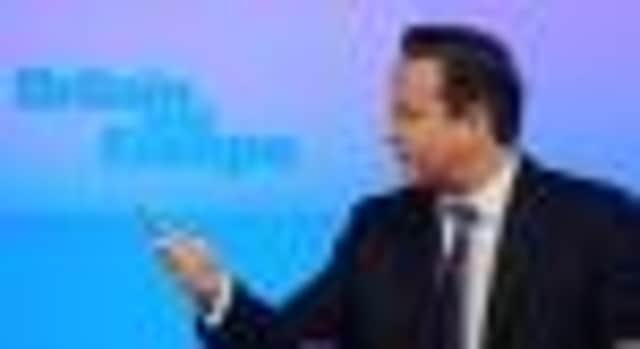Andrew Wilson: Yes-man David Cameron’s got a point on EU… but the hypocrisy is breathtaking


He is the first Conservative prime minister for decades who has sought to set out a positive, optimistic case for the best possible terms of engagement with the European Union. Rather than carping “No, No, No”, he is offering to campaign for “Yes”, but on his terms, and why not?
Now, of course, he may fail in negotiation in the way Harold Wilson largely did in the 1970s, but only a fool would go into any negotiation planning to fail. His is a pragmatic call for a new deal with power closer to the people and a recognition that centralisation fails but co-operation matters enormously. Again, bravo to that.
Advertisement
Hide AdAdvertisement
Hide AdMuch in the European mission is self-evidently off the rails and needs reform. The Eurozone continues to creak and the stability pact underpinning it is all but dead. The Common Fisheries Policy is profoundly flawed and it is not alone. The idea of a single market is impeccable but incomplete with whole swathes of trade remaining outside. Work in progress and to be done, not abandoned.
No way do I back withdrawal, but I do support engaging in reform positively and with all of our options open to look out for our own and the collective economic interest. So far so good. And the idea of putting any European deal to the test in a referendum again is difficult to fault on principle. Anyone born after 1957 hasn’t been asked their view on the relationship, so there is clearly a case to do so. So the PM has done what he is there to do, lead, and in doing so has set the terms of the debate.
The more cynical among you might doubt the intent, the motivation and the drive. He may well be stitching together a sack of ferrets more than half of whom want to erect barriers, diminish welfare rights and to retreat to a golden past. But far better to focus on the content of the debate than the white noise of politics that surrounds it. The decks have been cleared for a proper stock take on what government should do and where, and all things are possible. Good. If only the prime minister could apply the same principle and logic closer to home.
Having asked Europe for a new deal and then a test of public opinion the prime minister then tells Scotland: “No, decide whether you are in or out and then we will think about a reform deal. No consolation prizes for you guys.” In the words of Frank Sinatra, “it seems to me I’ve heard that song before”.
Having told Scotland that taking the time to consider its constitutional position would cause huge fear uncertainty and doubt, he is now taking twice as long on his one. Breathtaking. This hypocrisy just proves that we must ignore the litany of roadblocks and fears being manufactured to constrain our consent. Each and every one of the main scares mongered in the last 18 months is now exposed as false.
I am told that Kenneth Clarke raised in Cabinet the matter of the glaring inconsistency of the government’s position on Europe viz Scotland. But they clearly decided to press on regardless. Telling. It has exposed as puerile, facile and wrong whole flanks of cant. Enough of it all.
All possible futures are uncertain, the burden of proof now lies equally on all sides. Those who want us to sit in the pot, like a boiling frog waiting patiently to croak, must answer for inaction as much as those who want reform. Standing still in this world is more risky than leaping, especially when you consider how many living examples allow us to “look” before we do so.
The question we face is what sort of country do we seek, and will we equip ourselves with the best possible deal to make it there? Or will we stand pat with the main powers lying either in a Europe we aren’t properly represented in, or with a government in London where we get the leaders we choose roughly half the time.
Advertisement
Hide AdAdvertisement
Hide AdAnd as for the “economic uncertainty” caused by a legitimate democratic process? A word on that. Anyone observing the sheer chaos of the world economy will recognise that there is much more to worry about than a choice about what power should lie with which layer of government.
We live in a great moment of change and choice. It is true that inward investment to the UK could be put at risk if international capital really felt the economy would be outside the single market. So it’s up to all leaders to both promote jobs and democracy, not set one against the other.
The real risk of uncertainty comes from irresponsible leaders talking that risk up and their home country down. Enough of that please. There may be many good arguments about why Scotland shouldn’t reform its own relationship with Britain and the EU on the precise terms that suit Scotland best. If that can be good for all, including the rest of Britain and the EU, all well and good. I say there may well be arguments, but I can’t think of one right now. Can you? «
Twitter: @AndrewWilsonAJW